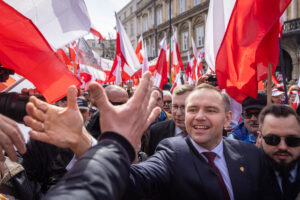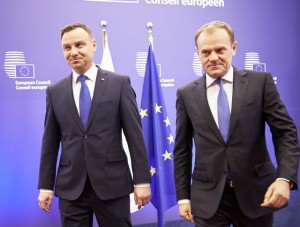Brussels – The first round of the presidential elections in Poland closed with a highly uncertain outcome: Rafal Trzaskowski, centrist mayor of Warsaw and candidate of the Prime Minister’s Civic Coalition, won 31.3 percent of the vote, with Karol Nawrocki, a historian backed by the Law and Justice (PiS) party, closely following with 29.5 percent, according to data from the National Election Commission, which has just completed the count. The two candidates will compete in a runoff on June 1, in a contest that already appears to be a referendum on the country’s future direction.
The result is tighter than expected and highlights a deeply divided Poland. Trzaskowski, long a favorite in the polls, has gradually narrowed his lead over Nawrocki in recent weeks. The vote on Sunday (May 18) confirmed a polarized political landscape and gave further momentum to radical right-wing forces.

The clash between Trzaskowski and Nawrocki is not just between two personalities but between two ideas of Poland. The former represents a pro-European, progressive, and reformist project, in line with the government of Donald Tusk, which promises to strengthen democratic institutions, reform justice, and restore the rule of law. The second candidate — like outgoing President Andrzej Duda — presents himself as heir to the sovereignist populism of PiS and defender of traditional values with a hard line on immigration, civil rights, and EU influence. Nawrocki has also publicly expressed his admiration for Donald Trump, evoking a conservative and anti-establishment vision. His campaign was characterized by rhetoric hostile to migrants and opposed to so-called “woke values,” seeking to mobilize the conservative PiS electorate and supporters of the far right.
Crucial to the runoff will be the voter behavior of Slavomir Mentzen, the libertarian far-right leader who came in third with 14.8 percent of the vote. Mentzen, known for his eurosceptic and anti-immigration positions, has often criticized the presence of more than one million Ukrainian refugees in Poland, accusing them of taking advantage of the system. His success would be a testament to the growing discontent among some voters who resent the alternating power of the two main coalitions.

Immediately after the results, Nawrocki appealed to Mentzen and his constituents, “Help me save Poland and stop Donald Tusk’s march toward monocracy,” he said. Trzaskowski called Nawrocki a “radical” who risks further exacerbating the country’s polarization.
Another name that has attracted attention is that of Grzegorz Braun, a deputy from the extreme right of Confederation, who, according to exit polls, won 6.3 percent of the vote, placing him in fourth place. Braun recently came under investigation after using a fire extinguisher to extinguish Hanukkah candles in the Polish parliament to protest the public celebration of Jewish holidays. This act also cost him the revocation of his immunity as an MEP. His achievement confirms the growing influence of ultraconservative movements in the country.
The center-right and the left, on the other hand, recorded modest results: about 15 percent of the vote went to Szymon Holownia of the environmentalist party Polska 2050, New Left candidate Magdalena Biejat, and radical leftist representative Adrian Zandberg. Trzaskowski will now have to try to attract these segments of the electorate to consolidate his lead in the second round.
Many observers described the 2025 presidential election as crucial for Polish democracy. President Duda has often blocked the reforms of the Tusk government, obstructing parliamentary appointments and decisions. According to Jacek Kucharczyk, president of the Institute for Public Affairs in Warsaw: “The stakes are enormous for the governing coalition and the future of democracy in Poland.” In his view, only with the collaboration of the next president will it be possible to push through reforms fundamental to the Tusk agenda, such as the independence of the judiciary, the liberalization of abortion, and the introduction of civil unions.

Polish President Andrzej Duda and Prime Minister Donald Tusk (Photo: EU Council)
European capitals will also closely watch the June election outcome. Poland, bordering the Russian enclave of Kaliningrad, warring Belarus, and Ukraine, is a strategic pivot for NATO and military support for Kyiv. Under Tusk’s leadership, Warsaw has chosen to be a strong voice against Moscow in Eastern Europe. However, the uncertainty emerging from this first round reopens the risk of a political crisis. According to some observers, a Nawrocki victory could cripple the current government and pave the way for the populists to return with renewed strength in the next legislative elections. The final verdict is two weeks away, but it already seems clear that the second round will not just be an election clash but a decisive watershed for Poland and Europe.
English version by the Translation Service of Withub







